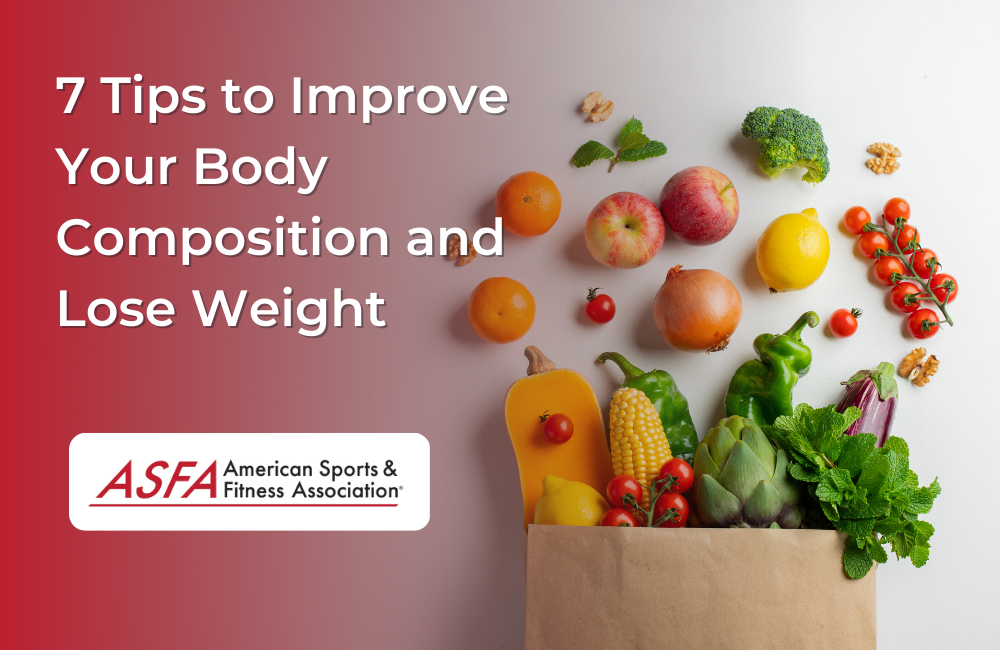Losing weight and improving your body composition require dedication, consistency, and a well-rounded approach to fitness, nutrition, and a balanced diet. Here are seven detailed tips to help you achieve your goals:
1. Set Realistic Weight Loss Expectations
Before starting your fitness journey, it’s crucial to set realistic expectations. Achieving a healthy weight is a gradual process that requires patience and consistency. Achieving significant changes in your body composition takes time and patience. Understand that everyone’s body responds differently to exercise and diet. Setting achievable short-term goals, like losing one pound per week, can help keep you motivated and on track. Reward yourself for meeting these milestones to maintain your motivation and commitment.
2. Train with Weights and Physical Activity
Weight training is essential for improving body composition. Building lean muscle mass through resistance training helps increase your metabolism, allowing you to burn more calories even at rest, which supports maintaining a healthy body weight. Focus on compound exercises like squats, deadlifts, bench presses, and rows, which work multiple muscle groups simultaneously and help build overall strength and muscle mass. Incorporate a variety of exercises to target different muscles and prevent plateaus. Always use proper form to avoid injury and maximize effectiveness.
3. Incorporate High-Intensity Interval Training (HIIT)
HIIT involves alternating between short bursts of intense activity and periods of rest or low-intensity exercise. Incorporating HIIT into your routine can complement your efforts of eating fewer calories, leading to more effective weight loss. This type of training is highly effective for burning calories and improving cardiovascular fitness in a shorter amount of time compared to traditional cardio workouts. During HIIT sessions, perform exercises like burpees, sprinting, jump squats, and mountain climbers. Adjust the intensity and duration of intervals based on your fitness level. Beginners might start with 30 seconds of high intensity followed by 30 seconds of rest, while more advanced individuals can increase the intensity and decrease the rest periods.
4. Get Adequate Sleep
Sleep is a critical component of a successful fitness plan. Quality sleep helps with muscle recovery, hormone regulation, and overall health. Aim for 7-8 hours of uninterrupted sleep per night. Establish a bedtime routine to help improve sleep quality: avoid screens an hour before bed, keep your sleeping environment cool and dark, and practice relaxation techniques like meditation or deep breathing exercises.
5. Manage Stress Levels for Weight Loss
Chronic stress can hinder your weight loss efforts by increasing cortisol levels, which promote fat storage, especially around the midsection. Incorporate stress management techniques into your daily routine, such as yoga, meditation, deep breathing exercises, or simply spending time with loved ones. Regular physical activity also helps reduce stress levels. Finding activities you enjoy will make it easier to stick with them and reduce stress over time.
6. Drink Plenty of Water
Staying hydrated is crucial for maintaining optimal physical performance and overall health. Water aids in digestion, nutrient absorption, and muscle function. It also helps control hunger and keeps your metabolism running efficiently. Aim to drink at least eight 8-ounce glasses of water per day, and increase your intake during and after workouts to compensate for fluid loss through sweat. Drinking water before meals can also help you feel fuller and prevent overeating.
7. Avoid Processed Foods with a Healthy Eating Plan
Processed foods often contain high levels of unhealthy fats, sugars, and sodium, and lack essential nutrients. They can contribute to weight gain and negatively impact your body composition. A healthy eating plan that avoids processed foods and focuses on whole, nutrient-dense foods is crucial for weight loss. Developing healthier eating habits by consistently choosing nutritious, unprocessed foods can significantly impact your weight loss journey. Instead, focus on consuming whole, nutrient-dense foods such as fruits, vegetables, whole grains, lean proteins, and healthy fats. These foods provide the vitamins, minerals, and fiber your body needs to function optimally and support weight loss. Plan and prepare your meals in advance to avoid the temptation of processed foods.
Achieving weight loss and improving body composition involves a combination of consistent exercise, proper nutrition, adequate rest, and stress management. By setting realistic goals, incorporating weight training and HIIT, prioritizing sleep and hydration, managing stress, and focusing on whole foods, you can make significant strides toward your fitness goals. Stay dedicated, listen to your body, and adjust your approach as needed to ensure continued progress. If you’re looking to deepen your knowledge and skills, consider taking courses from the American Sports & Fitness Association (ASFA), such as Personal Trainer and Group Fitness Instructor certifications. These courses can provide valuable insights and tools to help you and others achieve their fitness goals.





